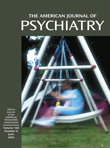Dr. Casacalenda and Colleagues Reply
To the Editor: We thank Dr. Rifkin for his thoughtful comments, in particular for emphasizing the importance of including a meaningful comparison group in any study comparing the efficacy of drugs and psychotherapy for the treatment of major depression. As discussed in our article, this approach “is the only safeguard against…inadequate implementation of pharmacotherapy, and nonspecific treatment effects” (p. 1357).
Dr. Rifkin points out that the study by Elkin et al. (1989) showed no advantage for imipramine or either of two psychotherapies over placebo. However, this conclusion was based on analyses comparing changes in scores on the Hamilton depression scale from pretreatment to posttreatment within each of the treatment conditions. Secondary analyses examining remission, the focus of our review, found that the effects of both imipramine and interpersonal therapy—but not cognitive behavior therapy—were superior to those of placebo.
Dr. Rifkin also concludes—erroneously in our view—that the study by Mynors-Wallis et al. (1995) “does not address the comparison of psychotherapy to drug treatment since the most relevant comparison (at 6 weeks) showed no drug effect for a well-proven drug treatment.” First, that study showed amitriptyline to be superior to placebo at 6 weeks on the basis of another analysis comparing mean scores on the Hamilton depression scale before and after 6 weeks of treatment. Second, the remission rates at 6 weeks (29% for subjects taking amitriptyline versus 3% for subjects taking placebo), although not significantly different (the groups were small), were clearly clinically meaningful. Finally, the results at 12 weeks consistently showed that both amitriptyline and problem-solving therapy were superior to placebo but not significantly different from each other.
Finally, Dr. Rifkin expresses concern regarding lack of precision for the measures of efficacy in the study by Jarrett et al. (1999). Again, we believe this was attributable to the small group sizes in this study and in no way casts doubt on their finding of no difference in efficacy between phenelzine and cognitive therapy since they consistently showed, across five different stringent definitions of remission, that the remission percentages for both active treatments were almost identical to each other and approximately double that for the placebo group.
Therefore, despite the limitations of each study reviewed, the remarkably consistent findings across these studies lead us to conclude, as we did in our original review, that “antidepressant medication…and psychotherapy…were more efficacious than control conditions, but there were no differences between active treatments” (p. 1355).



